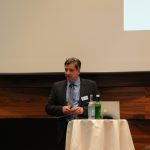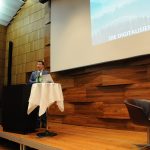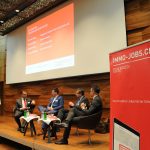Review 74th Swiss Real Estate Talk: "IoT in building operations".
The Internet of Things (IoT) is also increasingly occupying the real estate industry. As the most recent Swiss Real Estate Talk on the subject showed, there is still a great deal of development potential in this area.

"Fata Morgana or profitable business models?" was the subtitle of the 74th Swiss Real Estate Talk in mid-November in the event hall of Zurich's Metropol restaurant. Three well-versed experts from the real estate industry gave presentations on how IoT is already reflected in everyday real estate life today and what opportunities they see for the future.
"Mature sensor technology available"
For Thomas Stadler (CDO at Bouygues Energies & Services Schweiz AG), the first speaker of the evening, IoT is first and foremost a new world of sensors and measuring devices. The newly collected data can be used to gain new insights, analyze building usage and achieve efficiency gains in property management. "With relatively little effort, we can put these little sensors everywhere. We suddenly get new smart devices and buildings," said Stadler, whose presentation included the new Bouygues business unit InTec. "We already have mature sensor technology available today that allows us to apply IoT and smart building solutions. Technology is definitely no longer the limiting factor in building operations." The main obstacles are still on the human side: the connection between IoT and investors or building owners is still missing. In many cases, there is still a lack of awareness of the new services and benefits that new measuring devices can bring. Ultimately, the implication of new technologies and the willingness to do so at the highest management level are still lacking in many places.
"Moving away from fixture orientation".
Michael Rieder, Head of Digital Services Real Estate at Post Immobilien Mangement und Services AG, agreed with Stadler and explained: "We have to change our mindset." As one of the largest providers of facility management services and with a real estate portfolio of more than 2,000 properties, Swiss Post also faces the mammoth task of making its building stock smart, he said. "We've already been working on this for a good three years," Rieder said, "and we estimate it will take us another long time to implement it." In real estate operations, he sees a huge potential for value creation that needs to be leveraged. In the future, the main benefit will be in the area of BIM (Building Information Modeling), Rieder predicted. That is why Swiss Post, as a state-owned enterprise, has been relying on in-house innovations for some time. With IntelliClean, it has created a new product that has meanwhile been able to reduce cleaning requirements by 15 percent in the twelve test buildings thanks to the intelligent use of sensors. In 2019, 30 more postal properties should be able to operate more efficiently using IntelliClean, Rieder announced. He also called for a shift away from a purely "task-oriented" approach to building operation to "service on demand".
Many application areas for IoT in the real estate industry
Gerald Kremer, since October 2018 new Chief Digital Officer Global Real Estate at Credit Suisse Asset Management AGpointed out that currently only about one percent of the objects that could potentially be part of the Internet of Things are already connected to the Internet. But according to forecasts, there will be "more objects than people on the Internet" as early as 2020. By then, a total of around 50 billion objects will be "online. In the real estate sector, the market for smart buildings will grow to a volume of a good 36 billion Swiss francs. At the same time, companies have to admit that 75 percent of all IoT projects take twice as long as assumed at the beginning. It is therefore not surprising that the Internet of Things is not expected to reach the plateau of productivity until 2023 (according to Gartner Hype Cycle 2o18). For investors and asset managers, Kremer sees three main application areas for IoT. In property and facility management, for example, Credit Suisse considers energy efficiency optimization, predictive building operation and fully automated billing processes ("smart metering") to be the most important. In addition, the relationship between property and user is becoming more interactive, thanks to tenant apps, for example. Finally, IoT applications are also opening up completely new business models, for example at the interface between the real estate and energy industries.
The "Internet of Things" in the real estate industry will gain even more momentum in the coming years, the three speakers agreed in the subsequent panel discussion (led by moderator Markus Schmidiger from IFZ).
Presentations:
Thomas Stadler, Bouygues Energies & Services Switzerland Ltd.
Michael Rieder, Post Real Estate
Gerald Kremer, Credit Suisse Asset Management















